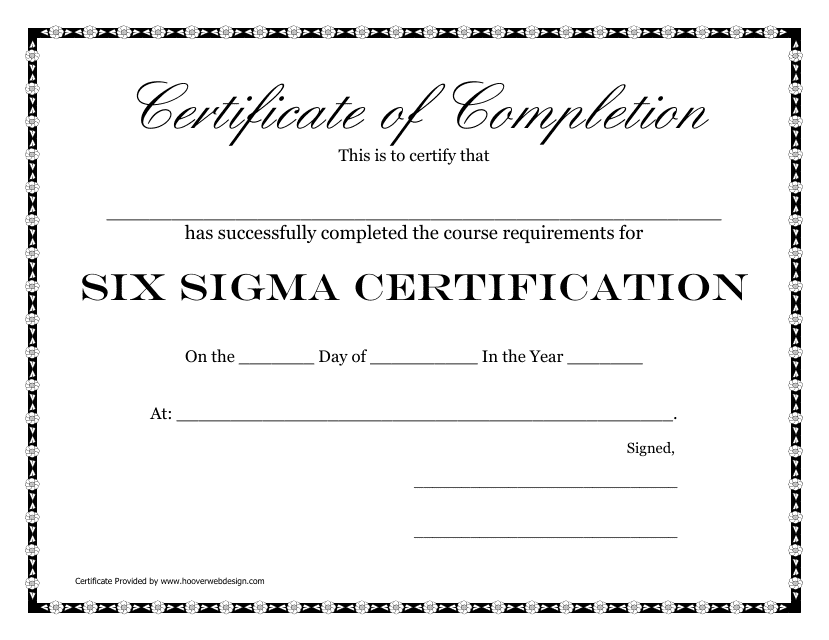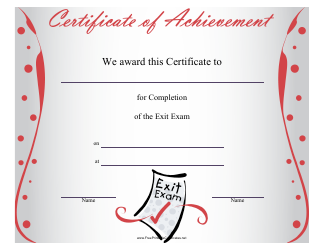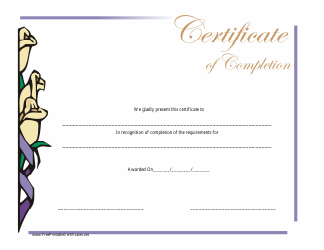Six Sigma Certificate of Completion Template
A Six Sigma Certificate of Completion template is used to recognize individuals who have successfully completed training and demonstrated proficiency in the principles and methodology of Six Sigma, a data-driven approach to process improvement.
The Six Sigma Certificate of Completion template is typically filed by the individual or organization that has completed the Six Sigma training program.
FAQ
Q: What is a Six Sigma Certificate of Completion?
A: A Six Sigma Certificate of Completion is a document that certifies an individual's completion of a Six Sigma training course or program.
Q: Why is a Six Sigma Certificate of Completion important?
A: A Six Sigma Certificate of Completion is important as it validates that the individual has acquired the necessary knowledge and skills related to Six Sigma methodologies and tools.
Q: Who can issue a Six Sigma Certificate of Completion?
A: A Six Sigma Certificate of Completion is typically issued by the training provider or organization that conducted the Six Sigma training.
Q: What information is typically included in a Six Sigma Certificate of Completion?
A: A Six Sigma Certificate of Completion typically includes the individual's name, the name of the training course or program, the date of completion, and the issuer's name or logo.
Q: Can a Six Sigma Certificate of Completion be verified?
A: Yes, a Six Sigma Certificate of Completion can usually be verified by contacting the training provider or organization that issued the certificate.
Q: Is a Six Sigma Certificate of Completion a professional certification?
A: No, a Six Sigma Certificate of Completion is not a professional certification. It is a document that confirms completion of a training course or program.
Q: Can a Six Sigma Certificate of Completion be used on a resume?
A: Yes, a Six Sigma Certificate of Completion can be mentioned on a resume to highlight the individual's training and knowledge in Six Sigma methodologies.
Q: Does a Six Sigma Certificate of Completion expire?
A: The expiration of a Six Sigma Certificate of Completion may vary depending on the training provider or organization. It is recommended to check with the issuer for their specific policies.
Q: Does a Six Sigma Certificate of Completion guarantee job opportunities?
A: While a Six Sigma Certificate of Completion can enhance a candidate's qualifications, it does not guarantee job opportunities. Other factors such as experience and skills are also taken into consideration by employers.
Q: Can a Six Sigma Certificate of Completion be used for career advancement?
A: Yes, a Six Sigma Certificate of Completion can be beneficial for career advancement as it demonstrates the individual's commitment to continuous improvement and quality management.
Q: Can I get a Six Sigma Certificate of Completion without completing a training course?
A: No, a Six Sigma Certificate of Completion is typically awarded to individuals who successfully complete a Six Sigma training course or program.
Q: How long does it take to complete a Six Sigma training course?
A: The duration of a Six Sigma training course varies depending on the level and depth of the program. It can range from a few days to several weeks or even months.
Q: What are the different levels of Six Sigma?
A: The different levels of Six Sigma include Yellow Belt, Green Belt, Black Belt, and Master Black Belt. Each level represents a different level of expertise and responsibilities in Six Sigma projects.
Q: Are there any prerequisites for Six Sigma training courses?
A: The prerequisites for Six Sigma training courses may vary depending on the provider and the level of the program. Some programs may require prior knowledge or experience in quality management.
Q: What is the cost of a Six Sigma training course?
A: The cost of a Six Sigma training course varies depending on factors such as the level of the program, the training provider, and the location. It is advisable to research and compare different options.
Q: Is Six Sigma training only applicable to certain industries?
A: No, Six Sigma training can be applied to various industries and sectors, including manufacturing, healthcare, finance, and services. The concepts and methodologies are universal.
Q: What are the benefits of Six Sigma training?
A: The benefits of Six Sigma training include improved business processes, increased efficiency, reduced defects and errors, cost savings, and enhanced problem-solving skills.
Q: Is Six Sigma training recognized by employers?
A: Six Sigma training is recognized and valued by many employers as it demonstrates an individual's ability to contribute to process improvement and quality management initiatives.





















